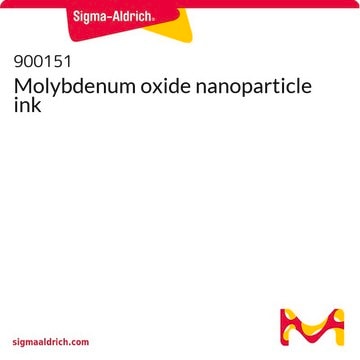793353
Tungsten oxide (WO3-x) nanoparticle ink
Sinónimos:
Avantama P-10, Nanograde P-10, Tungsten oxide nanoparticle dispersion, Tungsten oxide suspension, WO3 dispersion, WO3 ink
About This Item
Productos recomendados
form
dispersion
Quality Level
concentration
2.5 wt. % in 2-propanol
particle size
<50 nm (BET)
density
0.7992 g/mL at 25 °C
General description
Annealing temperature <100°C.
Application
Other Notes
Working conditions: Application and film drying under nitrogen (or low humidity)
Post-treatment: Annealing of deposited WO3-x films at 80°C - 120°C
Legal Information
signalword
Danger
hcodes
Hazard Classifications
Eye Irrit. 2 - Flam. Liq. 2 - STOT SE 3
target_organs
Central nervous system
Storage Class
3 - Flammable liquids
wgk_germany
WGK 1
flash_point_f
53.6 °F - closed cup
flash_point_c
12 °C - closed cup
Certificados de análisis (COA)
Busque Certificados de análisis (COA) introduciendo el número de lote del producto. Los números de lote se encuentran en la etiqueta del producto después de las palabras «Lot» o «Batch»
¿Ya tiene este producto?
Encuentre la documentación para los productos que ha comprado recientemente en la Biblioteca de documentos.
Los clientes también vieron
Artículos
Find advantages of inorganic interface layer inks for organic electronic & other applications.
Professors Tokito and Takeda share design principles and optimization protocols for organic electronic devices, focusing on flexibility and low cost.
Professors Tokito and Takeda share design principles and optimization protocols for organic electronic devices, focusing on flexibility and low cost.
Professors Tokito and Takeda share design principles and optimization protocols for organic electronic devices, focusing on flexibility and low cost.
Nuestro equipo de científicos tiene experiencia en todas las áreas de investigación: Ciencias de la vida, Ciencia de los materiales, Síntesis química, Cromatografía, Analítica y muchas otras.
Póngase en contacto con el Servicio técnico









